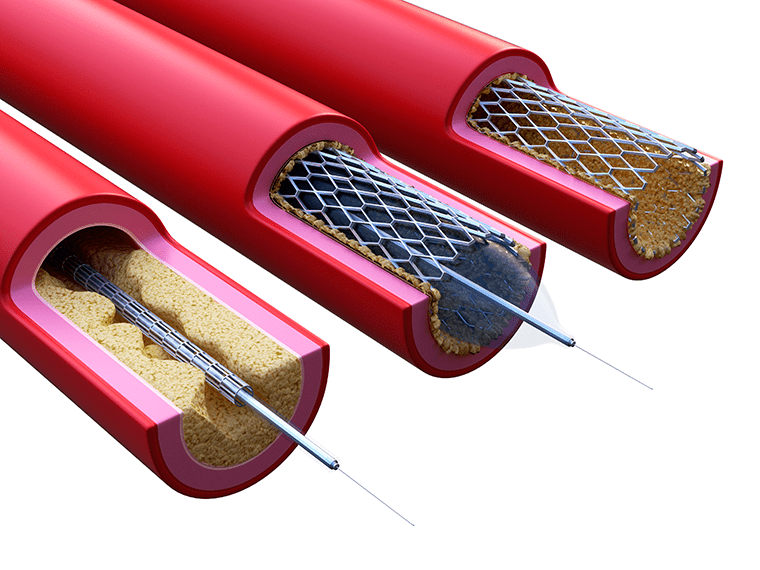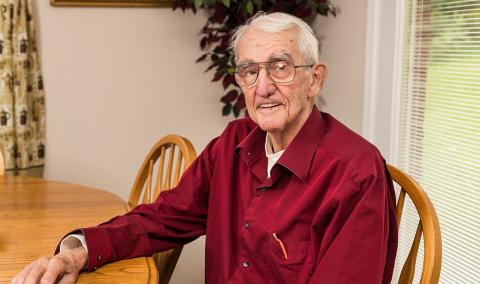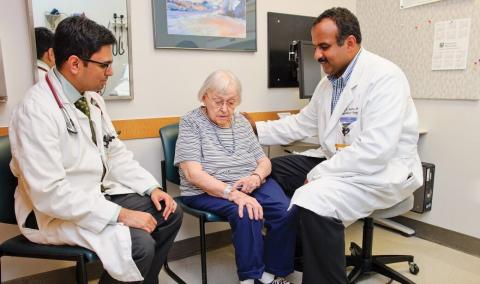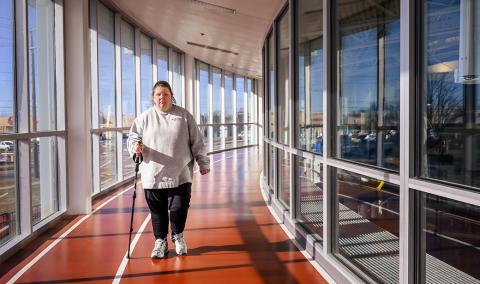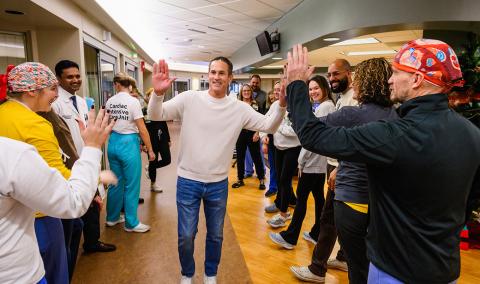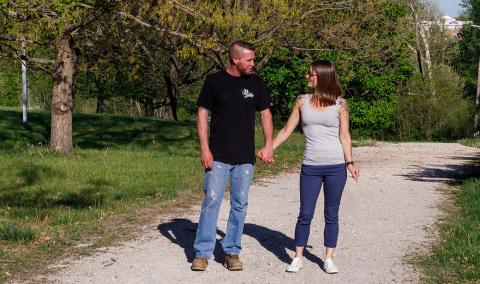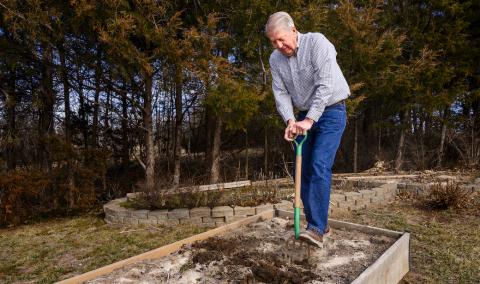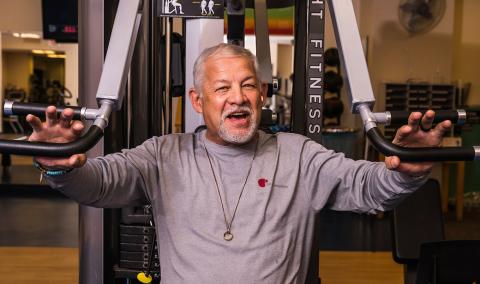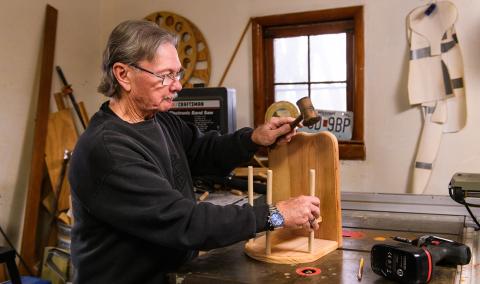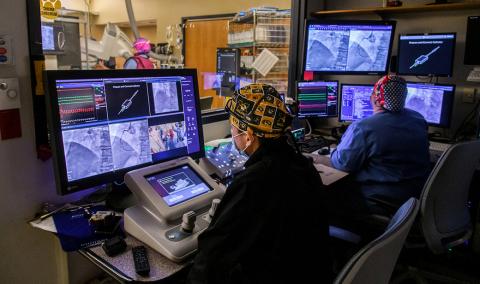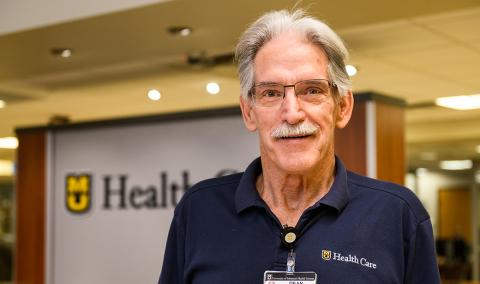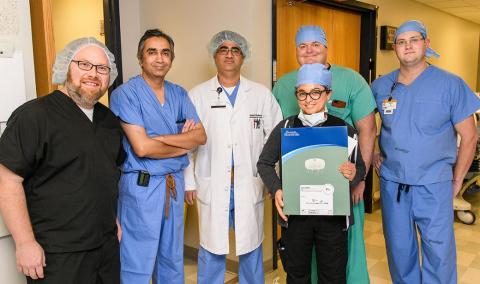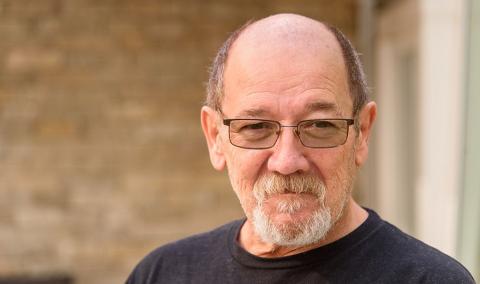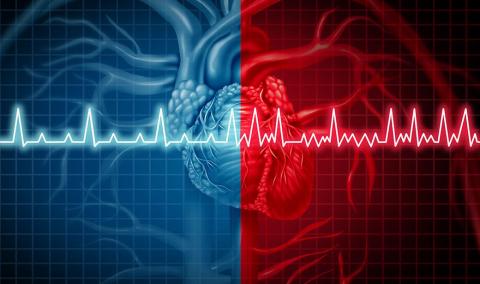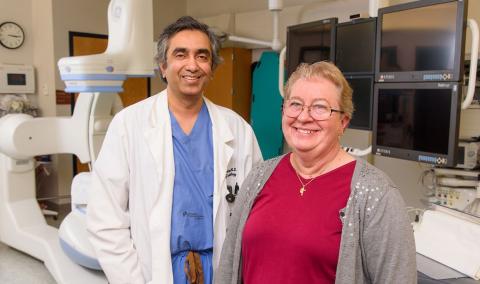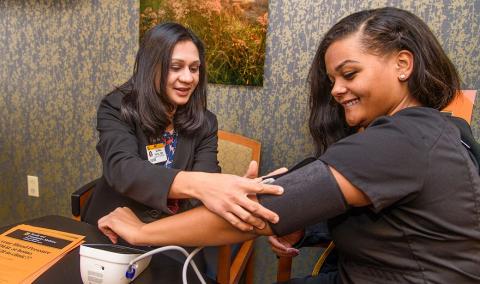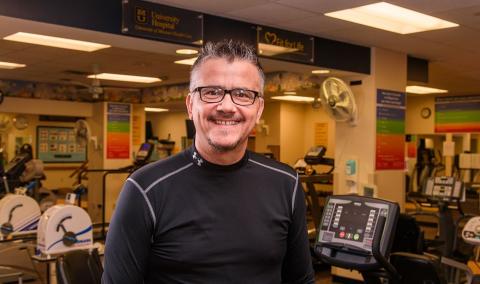When you’re having a heart attack, our doctors can provide lifesaving treatment within 47 minutes, on average. This is much faster than the national goal of 90 minutes. By performing interventions quickly, we can save as much of your healthy heart muscle as possible.
Your coronary arteries supply blood and oxygen to your heart. So when your coronary arteries are severely narrowed or completely blocked, they cannot supply the oxygen-rich blood your heart needs. As a result, your heart muscle begins to die, causing a heart attack (also known as a myocardial infarction).
Our interventional cardiologists can stop your heart attack by treating blockages with percutaneous coronary intervention (PCI). This restores blood flow — allowing your heart to receive the oxygen it needs to pump blood throughout your body.
We’ll also help you recover and lower your risk of future heart attacks through additional treatments and cardiac rehab.
Symptoms of a heart attack
Every second counts when you’re having a heart attack. The sooner you get treatment, the less damage to your heart. That’s why it’s important to know the signs and get help right away if you experience symptoms.
Common warning signs of a heart attack include:
- Chest pain or discomfort
- Pain radiating through your arm, neck or jaw
- Shortness of breath
- Breaking out in a cold sweat
- Nausea or vomiting
- Unusual fatigue
- Heartburn
- Sweating
If you experience symptoms of a heart attack, call 911 right away.
Risk factors for a heart attack
You may be at risk for having a heart attack if you have:
- A history of smoking
- Diabetes
- High blood pressure
- High cholesterol
- Obesity
- Rheumatoid arthritis (an autoimmune disease that affects your joints)
How we treat your heart attack
If you are having — or are at risk for — a heart attack, your care plan may include:
- Immediate intervention
- Medications
- Cardiac rehab
Reopening blocked arteries
We can unblock your coronary artery in about 45 minutes from the moment you come through the door. That’s almost half the time of the national goal of 90 minutes.
Our experienced interventional cardiologists restore blood flow in your artery with percutaneous coronary intervention (PCI), also called angioplasty with stenting.
During this minimally invasive procedure, your interventional cardiologist:
- Guides a catheter with a balloon tip through your artery to reach the affected area of your heart.
- Inflates the balloon.
- Places a stent (small mesh tube) to restore blood flow and keep your artery open.
We also use the latest technological equipment, like robotics, to navigate more difficult blockages.
With this advanced training and equipment, we can treat the most complex conditions, like chronic total occlusion.
Medications
Following your PCI, you’ll work with your provider on a care plan.
Your provider may recommend medications to help improve your overall heart health — and prevent future heart attacks.
We offer the latest and most effective medications, including:
- Clot-preventing medications to prevent blood clots, which cause a heart attack when they build up and block your artery. These latest medications may work faster and last longer.
- Statins to lower your cholesterol, preventing fatty buildup and blockages in your arteries that can cause a heart attack. These latest medications may cause less side effects, like muscle aches.
If statins do not lower your cholesterol, or if you experience uncomfortable side effects, we also offer:
- Injectable medications, which you take every two weeks or monthly. You can get these from our Mizzou Pharmacy locations and administer them yourself at home.
- Infusion treatments, which you receive every six months. Our clinic administers these without having to use an intravenous line (IV) in your hand or arm.
Cardiac rehab
While recovering from a heart attack can be challenging, it’s also an opportunity to improve your strength and overall well-being.
Our specialists can help you build healthier everyday habits to prevent future heart attacks. They’ll work with you on a rehab plan that focuses on exercise, diet and mindfulness.
Level 1 STEMI center
MU Health Care holds the highest designation in Missouri for treating STEMI (ST-Elevation Myocardial Infarction). STEMI is a specific type of heart attack caused by the complete blockage of an artery.
As a Level 1 STEMI center, heart attack specialists are available 24 hours a day, seven days a week.
A team approach to heart attack care
We believe a team approach to heart attack care can make all the difference with improving your quality of life.
If you have had — or are at high risk for — a heart attack, you’ll work with a range of specialists. They’ll work with each other and you to determine the right treatment for your specific needs.
Your care team may include:
- Primary physician
- Cardiologist
- Interventional cardiologist
- Pharmacist
- Chest pain specialist
- Heart failure specialist
- Dietitian
- Physical therapist
- Occupational therapist
- Advanced practice providers
- Nurse coordinator
Support for medication affordability
Our goal is to keep medications affordable. If you’re unsure about your insurance coverage, we can make sure your medications are covered before prescribing them.
We can also negotiate prices directly with the insurance companies — or offer samples or coupons through our pharmacy.
Related Conditions & Treatments
- Aortic Disease Care
- Atrial Fibrillation (AFib) and Arrhythmia
- Carotid Artery Disease
- Chest Pain
- Chronic Total Occlusion (CTO)
- Congenital Heart Disease
- Coronary Artery Disease
- Cardiothoracic Surgery
- ECMO Heart and Lung Life Support
- Heart Attack
- Congestive Heart Failure
- Heart Valve Disease
- Pediatric Cardiology
- Pediatric Vascular Anomalies
- Peripheral Artery Disease (PAD)
- Structural Heart Program
- Transcatheter Aortic Valve Replacement (TAVR)
- Vascular Surgery
- Women's Heart Health



